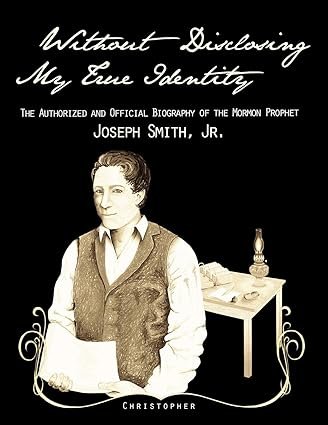Description
Introduction
The book “Without Disclosing My True Identity Joseph Smith, Jr.” presents an enigmatic and profound exploration of one of the most influential religious figures in American history. Joseph Smith, Jr., the founder of the Latter Day Saint movement, remains a figure of intense interest, debate, and reverence. This article delves into the contents of the book, offering a comprehensive understanding of Joseph Smith, Jr.’s life, contributions, and the ongoing impact of his teachings.
Who Was Joseph Smith, Jr.?
Early Life and Background
Joseph Smith, Jr. was born on December 23, 1805, in Sharon, Vermont. His early life was marked by poverty and a strong religious upbringing, which heavily influenced his later spiritual pursuits. Smith claimed to have experienced visions from a young age, which eventually led him to establish the Church of Jesus Christ of Latter-day Saints.
Key Contributions and Influence
Smith’s most notable contribution is the founding of the Latter Day Saint movement and the authorship of the Book of Mormon, a religious text he claimed to have translated from golden plates revealed to him by an angel named Moroni. His teachings laid the foundation for what would become a global religious movement, with millions of adherents worldwide.
The Mystery Behind the Book Title
Significance of “Without Disclosing My True Identity”
The title of the book hints at the complex and often secretive nature of Joseph Smith, Jr.’s life and mission. Throughout his life, Smith navigated a world of skepticism, persecution, and intense scrutiny. The phrase “without disclosing my true identity” reflects his need to balance openness about his revelations with the necessity of protecting himself and his followers from hostility.
Interpretation of the Title
The title may also symbolize the broader struggle between public perception and private belief. Joseph Smith, Jr.’s role as a prophet and leader required him to maintain a certain mystique, shielding his true self from those who might not understand or accept his divine mission.
Themes Explored in the Book
Religion and Faith
At its core, the book is a deep exploration of religious belief and the nature of faith. It examines how Joseph Smith, Jr. grappled with his own faith, the challenges of leading a new religious movement, and the impact of his teachings on his followers.
Identity and Secrecy
The theme of identity is central to the book, reflecting the dual nature of Joseph Smith, Jr.’s life as both a public religious figure and a private individual. The concept of secrecy is also explored, highlighting the tension between revelation and concealment in his life and work.
Power and Authority
The book delves into the dynamics of power and authority, particularly how Joseph Smith, Jr. established and maintained his authority as a prophet and leader. It explores the challenges he faced from both within and outside his religious community.
Joseph Smith, Jr.’s Role in Religious History
Founder of the Latter Day Saint Movement
Joseph Smith, Jr.’s role as the founder of the Latter Day Saint movement cannot be overstated. His teachings and revelations laid the groundwork for what would become a distinct and influential branch of Christianity.
Contributions to Religious Thought
Beyond founding a new religious movement, Smith’s contributions to religious thought include his teachings on the nature of God, the purpose of life, and the potential for human exaltation. His ideas have had a lasting impact on religious discourse and continue to be studied and debated by scholars.
Analysis of the Book’s Structure
Writing Style and Format
The book is written in a reflective and analytical style, blending historical narrative with theological exploration. The format is designed to guide readers through the complex and often controversial aspects of Joseph Smith, Jr.’s life and legacy.
Key Sections and Chapters
The book is divided into several sections, each focusing on a different aspect of Joseph Smith, Jr.’s life and teachings. Key chapters include an examination of his early visions, the translation of the Book of Mormon, and the challenges he faced as a religious leader.
Understanding the Historical Context
The Era of Joseph Smith, Jr.
Joseph Smith, Jr. lived during a time of significant religious and social upheaval in America. The early 19th century was marked by the Second Great Awakening, a period of intense religious revival that influenced Smith and his contemporaries.
Social and Political Influences
The book also explores the social and political influences that shaped Joseph Smith, Jr.’s life and work. These include the challenges of establishing a new religious community in a hostile environment and the broader cultural tensions of the time.
The Impact of the Book on Modern Readers
Reception by Scholars and Theologians
“Without Disclosing My True Identity Joseph Smith, Jr.” has been met with a range of responses from scholars and theologians. Some view it as a crucial text for understanding Smith’s legacy, while others critique its portrayal of his life and work.
Influence on Contemporary Religious Thought
The book’s exploration of themes like faith, identity, and authority has influenced contemporary religious thought, particularly within the Latter Day Saint movement. It continues to be a source of inspiration and debate for modern readers.
Controversies Surrounding Joseph Smith, Jr.
Criticisms and Debates
Joseph Smith, Jr. has been a controversial figure since his time. The book addresses some of the criticisms and debates surrounding his life, including accusations of fraud, polygamy, and authoritarianism.
Defending Joseph Smith, Jr.’s Legacy
In response to these criticisms, the book also presents arguments defending Smith’s legacy, emphasizing his contributions to religious thought and the enduring impact of his teachings.
Key Takeaways from the Book
Lessons on Faith and Belief
One of the key takeaways from the book is the importance of faith and belief in shaping one’s identity and actions. Joseph Smith, Jr.’s life serves as a testament to the power of conviction and the challenges of leading a faith-based movement.
Understanding Identity and Integrity
The book also offers insights into the complexities of identity and integrity. It highlights the challenges Joseph Smith, Jr. faced in maintaining his sense of self while fulfilling his divine mission.
Joseph Smith, Jr.’s Lasting Legacy
Continued Influence in Religious Communities
Joseph Smith, Jr.’s legacy continues to influence religious communities around the world. His teachings and revelations are still central to the beliefs and practices of millions of Latter Day Saints.
Memorials and Tributes
Throughout the world, there are numerous memorials and tributes to Joseph Smith, Jr., reflecting his enduring impact on religious thought and culture.
The Book’s Relevance Today
Why the Book Still Matters
The themes explored in “Without Disclosing My True Identity Joseph Smith, Jr.” remain relevant today, offering valuable insights into the nature of faith, identity, and leadership. The book serves as a reminder of the ongoing influence of Joseph Smith, Jr. and his teachings.
Lessons for Modern Readers
Modern readers can draw important lessons from the book, particularly in understanding the complexities of faith and the challenges of maintaining integrity in the face of adversity.
Conclusion
“Without Disclosing My True Identity Joseph Smith, Jr.” is a compelling exploration of one of the most influential religious figures in American history. The book provides a deep understanding of Joseph Smith, Jr.’s life, teachings, and the lasting impact of his work. Through its analysis of faith, identity, and leadership, the book offers valuable insights for readers seeking to understand the complexities of religious belief and the challenges of leading a faith-based movement.
FAQs
What is the main message of the book?
The main message of the book is to explore the life, teachings, and legacy of Joseph Smith, Jr., focusing on themes of faith, identity, and leadership.
Why did Joseph Smith, Jr. choose not to disclose his true identity?
Joseph Smith, Jr. often needed to protect himself and his followers from persecution, which may have influenced his decision to keep certain aspects of his identity and mission private.
How has the book influenced modern religious thought?
The book has influenced modern religious thought by providing a detailed analysis of Joseph Smith, Jr.’s teachings and their impact on the Latter Day Saint movement and broader religious discourse.
What controversies surround Joseph Smith, Jr.?
Controversies surrounding Joseph Smith, Jr. include accusations of fraud, polygamy, and authoritarianism, which are addressed and debated in the book.
Is the book still relevant today?
Yes, the book remains relevant today as it offers insights into the enduring themes of faith, identity, and leadership, which continue to resonate with modern readers.




Reviews
There are no reviews yet.